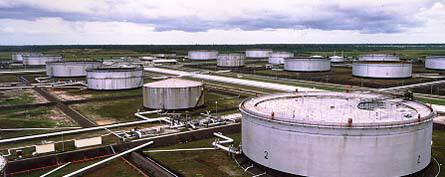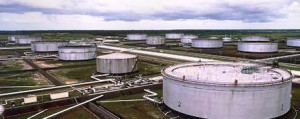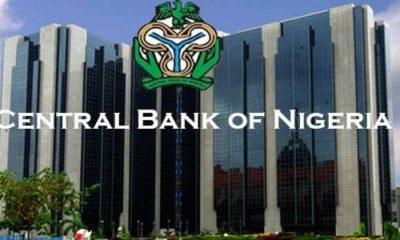Oil
Nigeria’s Q1 Crude export dips by $5.66bn

ABUJA-NIGERIA’S crude oil and gas exports dipped by $5.66 billion, about N1.13 trillion to $13.3 billion in the first quarter of 2015, according to the Central Bank of Nigeria, CBN. The CBN, in its External Sector Development Report for the first quarter of 2015, stated that crude oil and gas exports component declined from $18.96 billion and $20.85 billion in the fourth and first quarter of 2014 respectively to $13.30 billion.
The drop, notwithstanding, the CBN disclosed that crude oil and gas export accounted for 92.9 per cent of aggregate exports in the review period. The CBN further said that total external trade depreciated by 17.1 per cent from its fourth quarter 2014 figure to $26.74 billion in the first quarter of 2015.
The report blamed the dip in the value of external trade on the decline in crude oil receipts occasioned by fall in oil prices at the international market from an average of $70.00 per barrel in the fourth quarter of 2014 to $54.50 in the first quarter 2015. The CBN said: “Crude oil and gas exports component declined from $18.96 billion and $20.85 billion in fourth quarter 2014 and first quarter 2014 respectively to $13.30 billion and accounted for 92.9 per cent of aggregate exports in the review period.
“Non-oil exports which recorded $1.02 billion rose marginally by 2.0 per cent but declined by 8.9 per cent, respectively, when compared with the levels recorded in the preceding and corresponding quarters in 2014.
“Oil sector imports declined by 38.1 and 24.4 per cent while non-oil component declined by 12.9 and 3.8 per cent, respectively when compared with fourth quarter 2014 and first quarter 2014. Non-oil imports remained dominant, accounting for 83.7 per cent of total, while oil sector imports accounted for the balance.”
Also, the country spent $2.021 billion, about N404.2 billion, on the importation of crude oil and gas in the quarter under review, dropping by 38.31 per cent from $3.276 billion, about N655.2 billion recorded in the fourth quarter of 2014.
Foreign investment
The report further said that foreign investment inflow into the Nigerian oil and gas sector rose sharply from $46,459 in the fourth quarter of 2014 to $9.47 million, about N1.89 billion in the first quarter of 2015. Also, foreign capital inflow into the drilling sector rose slightly by 0.43 per cent from $1.004 million recorded in the fourth quarter of 2014 to $1.01 million in the first quarter of 2015.
The CBN said, “The inflow of fresh capital into the economy totaled $2.67 billion in first quarter 2015, representing declines of 40.5 and 31.6 per cent in comparison with the level in the preceding and corresponding quarters in 2014. “A disaggregation of capital imported to the various economic sectors revealed that the fresh capital was mainly channeled to purchase of quoted equities from the capital market which amounted to $1.28 billion and accounted for 47.9 per cent of the total in first quarter 2015.
“Capital inflows into the financing, telecommunications, and production and manufacturing sectors accounted for 28.6, 12.8 and 4.4 per cent, respectively, while other sectors accounted for the balance.”
Vanguard-
Oil
NNPC Targets 60% Methane Emission Reduction By 2031
The Nigerian National Petroleum Company Limited (NNPC) has unveiled a bold strategy to reduce methane emissions in the oil and gas sector by 60% by 2031, with an ultimate goal of achieving net-zero emissions by 2060.
This announcement reinforces Nigeria’s leadership role under the Global Methane Pledge initiative and its commitment to tackling climate change.
The Group Chief Executive Officer of NNPC, Mele Kyari, disclosed these plans during a meeting on Thursday with Robert Leahman, the U.S. State Department’s Global Methane Program Manager, and a delegation from Deloitte.
READ MORE: Atiku Gloats Over AUN’s Achievements Ahead Of 20th Anniversary
The discussions, held at the NNPC Towers in Abuja, focused on collaborative efforts to reduce methane emissions through innovative and sustainable practices.
“Reducing methane emissions is not just an environmental necessity but also a strategic imperative for Nigeria’s energy transition. We are leveraging partnerships to adopt global best practices and innovative solutions,” Kyari stated.
Key among these efforts is a pilot project in the Niger Delta, aimed at establishing emissions baselines, mitigating methane leaks, and promoting sustainable operations across Nigeria’s energy sector.
The project, a partnership between NNPC, Deloitte, and the U.S. Bureau of Energy Resources, will utilize data-driven methodologies to pinpoint and address methane hotspots.
Robert Leahman commended Nigeria’s proactive stance, describing it as a benchmark for other nations on the continent.
“Nigeria’s leadership under the Global Methane Pledge sets a standard for the continent. These initiatives will not only help reduce emissions but also drive sustainable development in the energy sector,” he said.
Kyari highlighted the broader benefits of addressing methane emissions, noting its significance for both environmental protection and economic efficiency.
“This collaboration is a game-changer. By addressing methane leaks, we’re reducing waste, saving costs, and protecting the environment. It’s a win-win for our economy and the planet,” he added.
Oil
FG Introduces New Incentives To Revitalize Nigeria’s Oil & Gas Industry
In a strategic move to revitalize Nigeria’s oil and gas sector, the Federal Government has unveiled two key fiscal incentives aimed at attracting investment and enhancing energy security.
The announcement was made by Mr. Wale Edun, the Minister of Finance and Coordinating Minister of the Economy on Wednesday.
The first initiative, the Value Added Tax (VAT) Modification Order 2024, introduces critical exemptions for essential energy products and infrastructure, including Diesel, Feed Gas, Liquefied Petroleum Gas (LPG), Compressed Natural Gas (CNG), Electric Vehicles, Liquefied Natural Gas (LNG) infrastructure, and Clean Cooking Equipment.
Read Also: Atiku Calls For Rotational Presidency Across Nigeria’s Geopolitical Zones
These exemptions are designed to reduce living costs for Nigerians, promote energy security, and accelerate the transition to cleaner energy alternatives.
The second initiative, the Notice of Tax Incentives for Deep Offshore Oil & Gas Production, offers new tax relief options for deep offshore exploration projects.
This measure aims to position Nigeria’s deep offshore basin as a premier destination for international oil and gas investments, boosting the country’s appeal to foreign investors.
These reforms are part of a broader set of policy initiatives, known as Policy Directives 40-42, endorsed by President Bola Ahmed Tinubu.
The directives reflect the administration’s commitment to fostering sustainable development in the energy sector and enhancing Nigeria’s competitive edge in the global oil and gas market.
Business
Tinubu set to approve ExxonMobil-Seplat oil deal, expands CNG bus initiative

By Yemie Adeoye
NIGERIA’s President Bola Tinubu has announced that the protracted ExxonMobil-Seplat upstream oil divestment will be formally approved by the Minister of petroleum within a matter of days, just as he announced his government’s intention to expand the Compress natural Gas, CNG buses initiative.
The President who stated this during his Independence day nationwide broadcast stated that the move is in line with his administration’s commitment to free enterprise, free entry and free exit in investments which is the hallmark of his administration investment policy.
“Fellow compatriots, our administration is committed to free enterprise, free entry, and free exit in investments while maintaining the sanctity and efficacy of our regulatory processes. This principle guides the divestment transactions in our upstream petroleum sector, where we are committed to changing the fortune positively. As such, the ExxonMobil Seplat divestment will receive ministerial approval in a matter of days, having been concluded by the regulator, NUPRC, in line with the Petroleum Industry Act, PIA. This was done in the same manner as other qualified divestments approved in the sector.”
The President also seized the opportunity to plead with Nigerians to be patient with his administration’s reform policies. “As your President, I assure you that we are committed to finding sustainable solutions to alleviate the suffering of our citizens. Once again, I plead for your patience as the reforms we are implementing show positive signs, and we are beginning to see light at the end of the tunnel”.
“Our energy transition programme is on course. We are expanding the adoption of the Presidential Initiative on Compressed Natural Gas for mass transit with private sector players. The Federal Government is ready to assist the thirty-six States and FCT in acquiring CNG buses for cheaper public transportation.
Fellow Nigerians, while we are working to stabilise the economy and secure the country, we also seek to foster national unity and build social harmony and cohesion. Our economy can only thrive when there is peace”. he enthused.




















